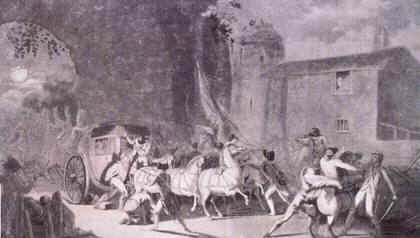|
The Flight to Varennes
Louis XVI was yet
another person who was very unhappy with the Civil Constitution. He agreed with the stubborn priests who refused to
comply with the new law. In doing so, he made it look like he, yet again,
opposed the revolution. This news meant angry crowds at the gates of the
Tuileries Palace.
Louis' wife and
several members of his court begged him to leave France as soon as
possible. Louis decided to leave with his family. He wanted to aim for the
Eastern French border, where many French princes had already built up
armies, which would reinforce his position. Marie Antoinette's brother,
Leopold, was the Emperor of Austria, and Louis hoped to get more help from
him. With this added force, Louis was confident that he would be able to
invade France, destroy the Assembly, and win back the power that they had
lost.
But leaving
France was not an easy task. The Assembly had guessed that Louis would
attempt to escape, and so there were guards at every door of the Palace.
The only way out was in secret.
On the 21st of June
1791, it was almost midnight when the royal family crept out of the
palace. They were disguised, and the door they used had been temporarily
unguarded. They climbed into a waiting carriage, which took them eastwards
towards a place called Montmédy, close to the eastern frontier. But 50 km
away from the border, they were recognised. Authorities were waiting for
them at the town of Varennes, where they were arrested and sent back to
Paris. The journey was hindered by crowds, shouting insults, and spitting
on the windows.
| |
|
|
|
|
 |
|
| |
Louis being
stopped at Varennes: a painting by Laurent Guyot |
|
War Threatens
The Flight to Varennes was the first step on the road to war. Emperor Leopold
was now sure that Louis and his family were in danger. He sent out a statement,
promising Louis that he would help him to regain his power. He and the King of
Prussia then called on all the European Kings and rulers to ask them to help
Louis.
Leopold didn't actually want to invade France. His statement was just to show
support for his sister and her husband. But nobody in France knew Leopold's
intentions. Everywhere, rumours were flying that the armies would soon invade.
Soon, everyone was convinced that the war was unavoidable.
Many French people actually wanted war. Those who supported Louis wanted it
because they were certain that the French armies would lose. Those who hated
Louis and supported the revolution wanted war because they thought that in this
way they could be absolutely sure whose side Louis was on. If he supported the
invaders, then the people could, and would, surely de-throne Louis, thus making
France a Republic. War
The 20th of April, 1792, the French armies declared war on Austria. They
believed that Austria and Prussia had been helping French aristocrats escape the
country. When the French armies attacked Austrian bases in Belgium, they were
hoping for a quick win. But the Austrian armies were better organised, too
well-equipped and far better led. They slaughtered the French attack. In Paris,
people suspected that there had been Austrian spies in the Tuileries Palace.
They blamed the French defeat on this. When Prussia joined forces with Austria
in May, people became more and more afraid.
The Assembly refused to let France fail. They ordered every soldier in
Paris to the frontier, kept an eye on all foreigners, expelled all priests who
would not take the oath of loyalty from France, and on the 11th on July,
appealed to all citizens to come and volunteer for the army, because they
declared that "La Patrie est en Danger." (The Fatherland is in
danger.)
These kind of extreme measures presented Louis with problems. What followed was
the "Storming
of the Tuileries."
 Back
to Main Events Back
to Main Events

|